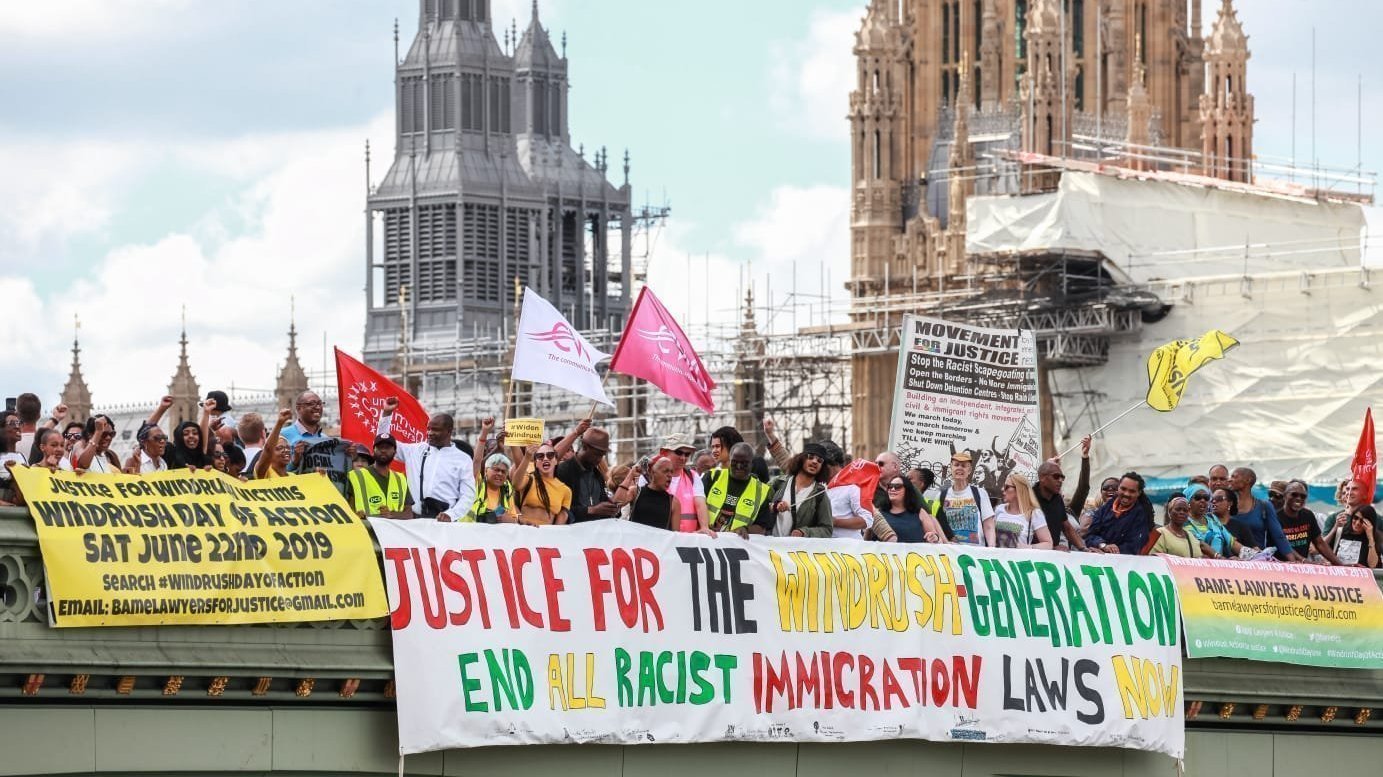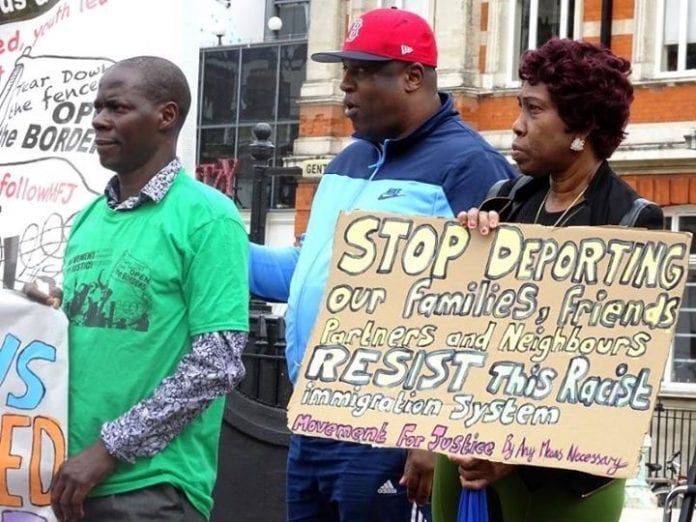
 |
||||
|---|---|---|---|---|
| Volume 53 Number 18, June 17, 2023 | ARCHIVE | HOME | JBCENTRE | SUBSCRIBE |

In a week in which the Prime Minister Rishi Sunak declared that Home Secretary Suella Braverman's "Stop the Boats" policy is "working", a policy which is a violation of international law and the UN refugee convention, events and exhibitions have been marking the 75th anniversary of the arrival of the Empire Windrush at Tilbury Docks in Essex on June 22, 1948. In the midst of the affirmation of the contribution of the "Windrush Generation" to the life of the country, little has been highlighted about what is termed the "Windrush Generation Scandal".

Photo: CNWnetwork
This "scandal" centres around the racism of the British state to citizens who migrated to Britain from some Commonwealth countries, often as children, not only from the Caribbean on the military transport ship Empire Windrush but for which that docking has become a symbol. In that sense, the "Windrush generation" refers to the people who arrived in Britain from Caribbean countries between 1948 and 1973.
As the Caribbean was in 1948 a part of the British Commonwealth, those who arrived were automatically British subjects and supposed to be free to permanently live and work in this country. However, as emerged in 2017, hundreds of Commonwealth citizens, many of whom were from the Windrush generation, have been wrongly detained, deported and denied legal rights, being falsely labelled as "illegal immigrants/undocumented migrants". Faced with widespread condemnation by the people, the British government announced in 2018 that it was commissioning a "Windrush Lessons Learned Review" and issued a so-called action plan in 2020. Justice has not been done yet, there is still a huge backlog of cases to be resolved, the claims take months to resolve and the compensation is insultingly small. The reason is to be found in the racism of the British state and ruling class which keeps detaining and deporting the migrants it deems to be undesirable, even under such tragedies as the Covid-19 pandemic. The hollow promises to recompense the Windrush generation are exposing this racism of the state, which is today running rampant with the inhuman treatment of refugees and those seeking asylum from the warfare and destruction that the powers-that-be have for generations been fomenting. This brutal treatment cannot be accepted for any human being.
Racist legislation has been enacted over the last fifty years and more which highlights the contempt which successive governments have displayed towards the countries of the Commonwealth and their former citizens. For example, the 1981 Nationality Act removed citizenship rights from those born and raised in Britain. Those who had come from Africa and the Caribbean and had been living in Britain legally for many years were required to register and apply for a newly defined "British citizenship" and to pay for the privilege.

Photo: NAARC
In recent years the Home Office, acting under the powers of the 2014 and 2016 Immigration Acts, has demanded that some British citizens, mainly of Caribbean origin, prove their rights to British citizenship, even if they have been living and working in Britain for decades. The 2014 Act was introduced by the then Home Secretary, Theresa May, who claimed that its aim was to create a "really hostile environment" for "illegal immigrants", by requiring immigration checks to be carried out by landlords, health and education workers and state officials. As was pointed out by democratic people at the time, it was clearly designed and would clearly operate in an openly discriminatory and racist manner. The 2016 Immigration Act strengthened and extended many of the draconian provisions of the 2014 Act. The 2014 Immigration Act emerged from a racist campaign whipped up by all the main political parties, which alleged that so-called illegal migrants constituted a major problem confronting society. The Coalition government of the time even despatched vehicles with billboards throughout London demanding that such migrants leave the country and "go home" at the earliest opportunity.
From about 2009, the Home Office had begun to destroy landing cards and other historical immigration documents that could prove the citizenship rights of Caribbean and other former migrants from the Commonwealth. Having destroyed the evidence of citizenship, the Home Office began to ask people to produce it. The destruction of such records by the state made this much more difficult in numerous cases and added to the discriminatory treatment meted out. Whistle-blowers within the Home Office have pointed out that the ramifications of destroying such records were perfectly well understood at the time. Often documentary evidence such as school and NHS records, and even National Insurance numbers, held for many years by the individuals concerned were declared by the Home Office to be insufficient evidence and, so officials said, produced "no track" of the individual who possessed them. [1]
By 2018 there were so many cases being presented in the press, and so many questions in Parliament, that representative of Caribbean governments requested a meeting with the Prime Minister, a request that was initially rejected. The Home Secretary, Amber Rudd, denied that there were government targets for deportations. When it became apparent that there were such targets, she was forced to resign and the new Home Secretary ordered a review into the entire scandal.

Cartoon - Financial Times
In 2020 it was reported that just over one thousand people had applied for compensation for victims of the Windrush scandal, but only 36 people had been compensated. A number of people born and raised in Britain, but with links to the Caribbean, continued to be denied citizenship rights. The current scandal has highlighted the fact that some of those who have lived and worked in Britain for many decades but were born in Commonwealth countries have been denied medical treatment, been refused employment or lost jobs, housing and benefits, while some have even been detained and threatened with deportation.
Since 2010 there have been no less than eight high level reviews and commissions, not including the review into the Windrush Scandal, which have all acknowledged various forms of "institutional racism", or that racism exists within state institutions including the police, criminal justice system and Home Office. Although such reports cannot openly acknowledge the existence of state racism as a preferred policy of the powers-that-be, the evidence is already overwhelming, as is the lived experience of millions of people. And, as the Institute of Race Relations for example points out, for refugees "the logic of deterrence (make life as miserable as possible so they leave) is encapsulated by accommodation conditions - with redundant cruise ships, ferries and barges, and possibly redundant oil rigs, commissioned to house asylum seekers".
It is truly breathtaking that the panoply of racist legislation, such as the Illegal Migration Bill, is being enacted at this time of the marking of "Windrush 75". Yet the people have also stepped up their demand that migrants and people seeking asylum be treated as human beings. Opposition to the racism of the state is a key task that working people are taking up at this time, as the movement grows to create a society that guarantees the rights of all by virtue of being human. We call on all democratic people to join in.
Note
1. H. Adi, African and Caribbean People in Britain (Allen Lane,
2022)